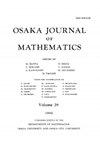具有无限离散对称的山口定理
IF 0.5
4区 数学
Q3 MATHEMATICS
引用次数: 2
摘要
将Bartsch, Clapp和Puppe关于紧李群的等变山口定理推广到无限离散群在其有限子群上满足极大性条件的集合。对称性在分析泛函[2],[20],[12]的临界点和集合中起着重要的作用。等变代数拓扑的发展,特别是等变同伦理论的发展,提供了一些工具来证明在紧李群作用下不变问题的临界点的存在性,如[11]所研究的。本文讨论了等变代数拓扑方法在无穷群作用集上的推广。本注的主要结果是将Bartsch, Clapp和Puppe最初证明的紧李群作用的结果,修改为无限离散群,其中有适当的有限子群族。定理1.1(山口定理)。设G是一个无限维实数空间E上由有界线性算子作用的无限离散群。假设G满足极大性条件1.2,且线性作用在0之外是固有的。设φ: E→R是C2−类的g不变泛函。对于任意值a∈R,定义子水平集φ = {x∈E | φ(x)≤a}和临界集K =∪c∈RKc,其中Kc为水平c上的临界集,Kc = {u |‖φ′(u)‖= 0 φ(u) = c}。设•φ(0)≤a,存在一个有限余维的线性子空间Ê∧E,使得Ê∩φ是两个闭子空间的不相交并,其中一个有界且包含0。•泛函φ满足沿轨道palais - small条件1.3。•群G满足极大有限子群条件1.2。那么,E相对于φ, G−cat(E, φ)的等变Lusternik-Schnirelmann范畴是无限的。如果临界集Kc在群作用下是紧致的,即商空间G Kc是紧致的,则φ(K)在上面是无界的。回想一下,给定一个自然数r,类Cr−表示其导数高达r阶且局部为Lipschitz的函数的类。条件1.2约束了极大有限子群及其共轭关系。1.2条件。设G为离散群,MAX为有限子群的子集。如果存在一个素数p,使得每一个非平凡有限子群都包含在一个唯一的极大p群M∈MAX中,则G满足极大性条件。•M∈MAX =⇒NG(M) = M,其中NG(M)表示M在G中的归一化式。本文章由计算机程序翻译,如有差异,请以英文原文为准。
Mountain pass theorem with infinite discrete symmetry
We extend an equivariant Mountain Pass Theorem, due to Bartsch, Clapp and Puppe for compact Lie groups to the setting of infinite discrete groups satisfying a maximality condition on their finite subgroups. Symmetries play a fundamental role in the analysis of critical points and sets of functionals [2], [20], [12]. The development of Equivariant Algebraic Topology, particularly Equivariant Homotopy Theory, has given a number of tools to conclude the existence of critical points in problems which are invariant under the action of a compact Lie group, as investigated in [11]. In this work we discuss extensions of methods of Equivariant Algebraic Topology to the setting of actions of infinite groups. The main result of this note is the modification of a result by Bartsch, Clapp and Puppe originally proved for actions of compact Lie groups, to infinite discrete groups with appropriate families of finite subgroups inside them. Theorem 1.1 (Mountain Pass Theorem). Let G be an infinite discrete group acting by bounded linear operators on a real Banach space E of infinite dimension. Suppose that G satisfies the maximality condition 1.2 and that the linear action is proper outside 0. Let φ : E → R be a G-invariant functional of class C2−. For any value a ∈ R, define the sublevel set φ = {x ∈ E | φ(x) ≤ a} and the critical set K = ∪c∈RKc, where Kc is the critical set at level c, Kc = {u | ‖φ ′ (u)‖ = 0 φ(u) = c}. Suppose that • φ(0) ≤ a and there exists a linear subspace Ê ⊂ E of finite codimension such that Ê∩φ is the disjoint union of two closed subspaces, one of which is bounded and contains 0. • The functional φ satisfies the Orbitwise Palais-Smale condition 1.3. • The group G satisfies the maximal finite subgroups condition 1.2. Then, the equivariant Lusternik-Schnirelmann category of E relative to φ, G− cat(E, φ) is infinite. If moreover, the critical sets Kc are cocompact under the group action, meaning that the quotient spaces G Kc are compact, then φ(K) is unbounded above. Recall that given a natural number r, the class Cr− denotes the class of functions whose derivatives up to order r exist and are locally Lipschitz. Condition 1.2 restricts maximal finite subgroups and their conjugacy relations. Condition 1.2. Let G be a discrete group and MAX be a subset of finite subgroups. G satisfies the maximality condition if • There exists a prime number p such that every nontrivial finite subgroup is contained in a unique maximal p-group M ∈MAX . • M ∈ MAX =⇒ NG(M) = M , where NG(M) denotes the normalizer of M in G.
求助全文
通过发布文献求助,成功后即可免费获取论文全文。
去求助
来源期刊
CiteScore
0.90
自引率
0.00%
发文量
0
审稿时长
>12 weeks
期刊介绍:
Osaka Journal of Mathematics is published quarterly by the joint editorship of the Department of Mathematics, Graduate School of Science, Osaka University, and the Department of Mathematics, Faculty of Science, Osaka City University and the Department of Pure and Applied Mathematics, Graduate School of Information Science and Technology, Osaka University with the cooperation of the Department of Mathematical Sciences, Faculty of Engineering Science, Osaka University. The Journal is devoted entirely to the publication of original works in pure and applied mathematics.

 求助内容:
求助内容: 应助结果提醒方式:
应助结果提醒方式:


